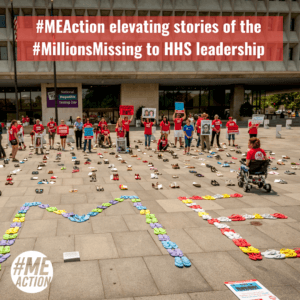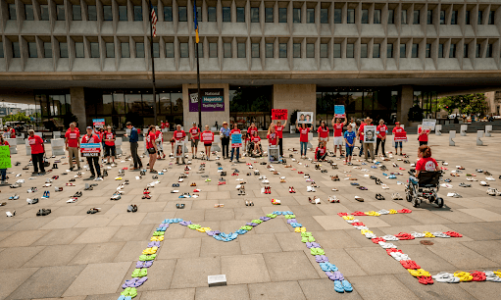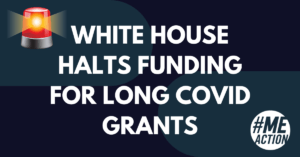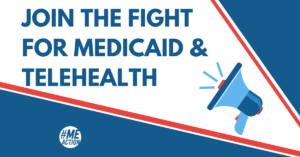#MEAction is advancing ME/CFS advocacy efforts through our ongoing engagement with U.S. federal agencies, including at the Department of Health and Human Services (HHS). We continue to fight for our government to do more to meet the needs of people with ME, and to ensure that the evolving Long COVID federal response includes ME/CFS.
Read more about the leading role HHS will play in the Long COVID response, #MEAction’s ongoing advocacy efforts to leadership, and the importance of centering the stories of the #MillionsMissing.

HHS to lead Long COVID and associated conditions response
This month the White House issued a Presidential Memorandum directing the Secretary of HHS to coordinate a new effort across the federal government to develop and issue the first-ever interagency national research action plan on Long Covid and associated conditions.
Many people with Long COVID have symptoms consistent with already known post-infectious chronic illnesses and are going on to acquire these diagnoses. In an accompanying statement, the administration acknowledged myalgic encephalomyelitis/ chronic fatigue syndrome (ME/CFS) as an associated condition of Long COVID, along with dysautonomia, and mast cell activation syndrome (MCAS).
In a press conference, HHS Secretary Xavier Becerra said, “We’re determined… to not leave anyone behind. And that includes our loved ones suffering from Long COVID and related conditions… We see you, we’re focused on you, and we are committed to advancing our nation’s capacity to understand and treat your conditions.”
#MEAction put out a statement in support of government mobilization to get equitable care, support, education, and research for Long COVID and associated conditions, including ME/CFS, emphasizing that people with ME understand the cracks in the system and must play a key role in fixing them. #MEAction board member JD Davids summarized his view saying, “My reaction is that I’m cautiously optimistic, and realistically skeptical.”
Engaging new leadership at HHS
Before this announcement of the leading role HHS would play in the inter-agency Long COVID response, #MEAction had been working since last summer to lay a foundation for ME/CFS advocacy with the new leadership at HHS through a series of meetings.
After Admiral Rachel Levine, MD was confirmed as the next Assistant Secretary of Health for HHS, Terri Wilder, #MEAction consultant and New York chapter co-leader, took the opportunity following a press interview with ADM Levine to briefly share her personal experience as a person living with ME. Terri requested that the Assistant Secretary meet with #MEAction to learn more about the issues facing people with ME that needed HHS attention.
Starting in August 2021, Terri Wilder, JD Davids and U.S. Advocacy Director Ben HsuBorger—all people living with ME—met with ADM Levine, and they continue to hold regular meetings with her staff on ME/CFS and Long COVID issues. #MEAction has briefed HHS leadership on the devastation of ME/CFS along with the inadequate federal response. We continue to strongly advocate to HHS that the new inter-agency Long COVID response not repeat the same mistakes with ME/CFS that were made in the past, and that the only way to accomplish this is to include people with ME as part of the solution.
Ahead of the White House’s announcement, we proactively communicated to HHS the importance that in both written statements and Secretary Becerra’s comments to the press, there was an explicit acknowledgement of the negative impacts of not only Long COVID, but also associated conditions, such as ME/CFS. Post-infectious chronic illnesses that are being diagnosed in people with Long COVID, like ME/CFS, dysautonomia and MCAS, need to be clearly named as part of this critical government effort. Long COVID should not be presented to the public as a totally new phenomenon that has never been seen before. The only difference now is that COVID is the precipitator, and its high incidence has resulted in greater visibility and impact of an ongoing chronic condition that has been neglected by our government.
Sharing Our Stories
#MEAction believes that while fighting for critical policy change from federal agencies can involve many technical aspects, the core of our work is about clearly, powerfully and authentically communicating the stories of those millions missing from ME/CFS, Long COVID, and other under-resourced complex, chronic conditions. They are the stories of those who get sick and stay sick and are often hanging by a thread in our society, our institutions, our healthcare systems.
If we want ME/CFS and associated conditions to be fully integrated into the Long COVID response, then we must broaden the story around chronic illness and illustrate the connections–a common thread— that we all share. In order to get the recognition, treatment, and support for ME/CFS, we have to first change the narrative.
That is why when we met with the HHS Assistant Secretary of Health, we made sure to invite people whose lives have been impacted by ME to share their personal stories with ADM Levine so she understands who the #MillionsMissing are and the barriers to health equity they face.
- Wilhelmina Jenkins shared her story as one of an entire generation who became sick in the 80’s and has been witness to how government, medicine, and social service systems overlook this disease, especially among African-Americans.
- Denise Lopez-Majano shared her story as the sole caregiver for her two sons who both developed severe ME as children.
- Jennifer Minhas shared her story as a nurse who became sick with Long COVID (and later ME/CFS) at the beginning of the pandemic and has seen first-hand how ill-equipped the healthcare system is to respond to the ME/CFS crisis.
ADM Levine said she was struck by how many similarities there appear to be between Long COVID and ME/CFS, and she shared how in her previous clinical pediatric practice she had seen quite a few teens with a range of ME/CFS symptom presentations. Her staff reiterated how putting a human face on abstract policy issues helped make important connections for them.
This is why storytelling matters. It makes the important connections that statistics alone cannot. Join us in training and events that will prepare us to be better activists and storytellers- and make our impact last!
- April 21st – Not Go Quietly Screening & Panel Discussion: One man’s journey to fight for health care for all. This beautiful film features Ady Barkan and the role his activism plays in his life and the lives of his family.
- April 24th – Tell Your Story Training: Kirsten Farrell from the Goodman Center leads us in key ways to tell our story in order to motivate action and create change.
- April 29th – Take a Perfect Photo Training: Taking a photo for #MillionsMissing may seem daunting, but we’ve got you covered in this training led by photographer Lucía Doynel.
May 12th – Join us for #MillionsMissing. We will come together using a global, virtual #MillionsMissing event, as well as other events on and offline to share our stories, art, and the urgency of the moment in order to build collective solidarity and a narrative for broad scale change.





